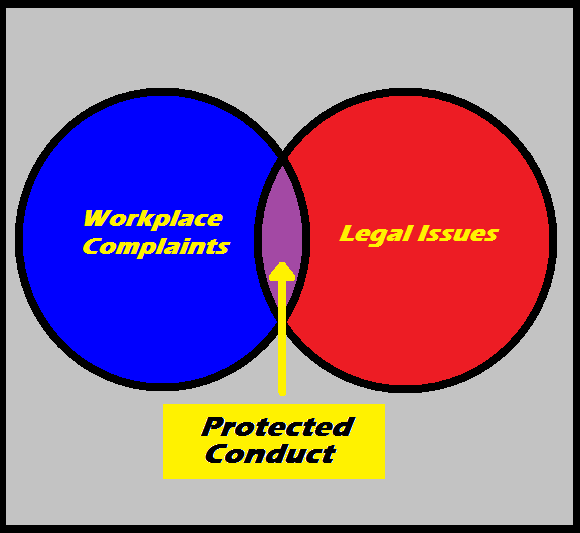Protected Conduct and the Scope of Retaliation Law
In the realm of employment law, one of the most frequently misunderstood terms is retaliation.
Employees often view the term too broadly, believing that the law prohibits all acts of retribution or punishment that follow a complaint of mistreatment. Conversely, employers often underestimate the number of circumstances in which they might have exposure to liability based upon allegations of retaliation.
The key to understanding the scope of the protections against unlawful retaliation can be summed up in two words: protected conduct.
“Protected conduct” is a catch-all for employee actions for which an employer is legally prohibited from imposing adverse consequences. They include, but are not limited to (1) allegations of or expressions of opposition to discriminatory conduct on the basis of race, color, sex, religion, national origin, age, disability, or other statutorily protected categories, (2) participation in formal proceedings related to discrimination claims, (3) invocation of rights to workplace accommodations, family and medical leave, or workers’ compensation benefits, (4) allegations of violations of laws that govern employer behavior or practices, and (5) expressions of opposition to violations of laws, rules and regulations (i.e. whistleblowers).
While the form of “protected conduct” can vary, a general rule for employees is that it must be specifically expressed. For example, an employee that believes he or she has been subjected to discrimination, but merely complains about “unfair treatment,” likely will not be found to have engaged in protected conduct. Similarly, many courts have held that retaliation prohibitions do not attach where an employee merely asserts that he or she has been subjected to “harassment” or a “hostile work environment,” but does not tie those allegations to a protected status (i.e. race, sex, age, etc.). Finally, an employee who seeks an accommodation, but does not put the employer on notice that the need has arisen from a disability, pregnancy or medical condition, may not be found to have triggered anti-retaliation protections.
Thus, while some employees may find it awkward or difficult to elevate general complaints in the workplace to specific allegations of legal violations, doing so is necessary to ensure that the “bubble of protection” provided by anti-retaliation laws are activated.
From the employer’s perspective, when an employee communication crosses the line between general workplace matters and protected conduct, a “red flag” should be raised. From that point forward, the employer must consider whether its actions might be construed by a third party as retaliatory.
Timing is a significant factor. If an employee is subjected to an adverse action within days of having engaged in protected conduct, the level of scrutiny will likely be very high. This does not mean that an employer is entirely handcuffed and cannot take actions necessary to effectively run its business. However, in doing so, it is advisable to have clear, objective and documented reasons for the measures taken.
We frequently provide assistance in this area. Representing employees, we often act as a guide, ensuring that communications with employers clearly invoke legal rights and qualify as protected conduct. Representing employers, we have extensive experience in assisting management in balancing legal obligations with business needs. In both cases, we strongly recommend that counsel be sought early in the process. Please contact us if you wish to consult on matters of this type.

